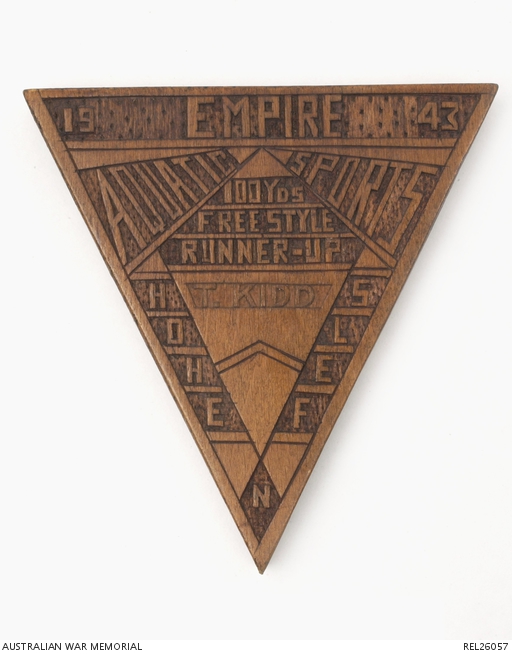| Place | Europe: Germany, Hohenfels |
|---|---|
| Accession Number | REL26057 |
| Collection type | Heraldry |
| Object type | Heraldry |
| Physical description | Wood |
| Maker |
Pickard, A J |
| Place made | Germany: Bavaria, Germany: Hohenfels |
| Date made | 1943 |
| Conflict |
Second World War, 1939-1945 |
Triangular wooden plaque for Empire Aquatic Sports, Hohenfels : Staff Sergeant E T W Kidd


Inverted triangular wooden plaque with rebated carved detail. The plaque has a bar at the top '19 / EMPIRE / 43'. Below this is 'AQUATIC' expanding diagonally to the left from a point beneath 'EMPIRE'. Expanding diagonally to the right from the same point is 'SPORTS'. Horizontally between these two words is 100 YDS / FREESTYLE / RUNNER-UP'. Rebated within an inverted triangular section which has not been rebated is the recipient's name 'T. KIDD' then a simple double chevron motif. 'HOHE' is carved down the lower left side of the basal point of the triangle, with 'N' being in the point, and 'FELS' proceeding up the lower right side. Handwritten in black pen on the reverse side is 'A.J. Pickard / 4 Hussars / P.O.W. / Germany / 21/5/43'.
Associated with NX2920 Staff Sergeant Ernest Thomas Watson Kidd who was taken prisoner of war on Crete in 1941. He was interned in Stalag XIIIC Hammelburg and two of its Arbeitskommandos (working camps) from September 1941 till January 1944, and in Stalag 383 at Hohenfels from January 1944 until April 1945. This plaque was won by him at the 'Empire Aquatic Sports Meet' held in Stalag 383 in July 1944. Kidd was a member of the Australian swimming team, who described themselves as the 'Human Hydroplanes'. The aquatic events were conducted in a large, open topped, in-ground, concrete lined, firefighting reservoir within the camp. The plaque was manufactured from a Red Cross wooden 'butter-box' case. Bulk supplies of Red Cross butter were sent to prisoners of war, in the 'butter-box' cases, via Argentina. The plaque was made by a fellow British prisoner, A J Pickard of the 4th Hussars. It was worked in 1943 but the competition for which it was awarded did not occur until 1944.